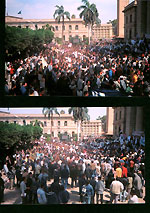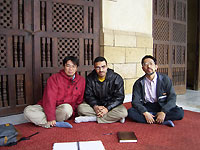| Period: 10 January - 31 March 2003. Country: Egypt |
|
(1)Mass Islamic Movements in Contemporary Egypt: A Study on the Da'wa of the Muslim Brotherhood and its Grassroots Activities |
| YOKOTA Takayuki (Division of Southeast Asian Area Studies) |
| Key Words: The Muslim Brotherhood, Islamic Social Activities, Islamic Party, Reform of Interpretation of Sharia, Democracy |

Anti-Iraq war demonstration held by the students at Cairo University on 25th May 2003. More than a thousand students participated in it. |

Interview with an Azharite student at Azhar mosque, one of the most authoritative centers of Islamic studies. |
(2) The aim of my Ph. D. dissertation is to examine the
activities and ideas of the Muslim Brotherhood, which is regarded as one of the
most important Islamic revival movements in Egypt.
The Muslim Brotherhood was founded in 1928 by Hasan al-Banna (1906-49) with the aim of reviving Islam and establishing an Islamic government. It began making da'wa (call to Islam) to the masses for the first time in the Middle East, and rapidly developed grassroots activities to mobilize the masses. At the end of the 1940s, the Brotherhood became one of the most powerful political organizations in Egypt. After a crackdown by Nasser, the Brotherhood experienced a revival in the 1970s, and has played an important role as the largest Islamic movement in Egypt. At present, it has gained many members through its vigorous da'wa, and has developed many kinds of grassroots activities, such as medical clinics, mutual help organizations and publications. The model for grass-roots Islamic revivalism was presented by the Brotherhood in the first half of the 20th century, and has developed with it up to the present.
However, in spite
of its importance, there is still little research on the Brotherhood, and there
is a clear need for further researches. In my Ph. D. dissertation,
I will examine the activities and ideas of the Brotherhood synthetically from
the viewpoint of da'wa, its principal idea, and will present a new perspective
by which to understand grassroots Islamic revivalism. I will analyze
the Brotherhood's ideas using the writings of members and of its journal, al-Da'wa. In
addition, I will carry out field research on its grass-roots activities, and
will focus particularly on social service activities such as educational activities
and medical clinics, as well as the Wasat Party, which was formed by ex-Brotherhood
members who advocated a mass-based "Islamic democracy."
(3) In my fieldwork conducted in Cairo from 14 January to 31 March 2003, I conducted research mainly on the Wasat Party, a movement with the aim of forming a political party carried out by young ex-Brotherhood members. Although the Wasat Party is still not legally recognized, it is important in considering new developments in the Islamic revival movement, since it seeks new possibilities for da'wa as a means to organize the Islamic revival movement into a legal political party. I visited the party headquarter in Cairo and carried out interviews with some members including Abu al-Ala Madi, the leader of the party. Through this, I was able to do detailed investigations of the principal ideas of the party. The Wasat Party distinguishes Islam into "Islam as religion" and "Islam as civilization," and advocates the establishment of an "Islamic democracy" derived from the latter. "Islam as civilization" means "good principles,” which are held jointly by all the people who live in the area of its civilization, including not only Muslims but also Christians. Under "Islamic democracy," the equality of people as Egyptian citizens is more important than differences of religions. The idea thus appears of the party working to avoid religious conflicts in Egypt and to attain Islamic policies. In the Egyptian political situation, with its limited democracy, the Wasat Party is working to break through the difficulties and limitations of the illegal status of Islamic revival movements, such as the Muslim Brotherhood.
|


 21st Century COE Program
-Aiming for COE of Integrated Area Studies-
21st Century COE Program
-Aiming for COE of Integrated Area Studies-